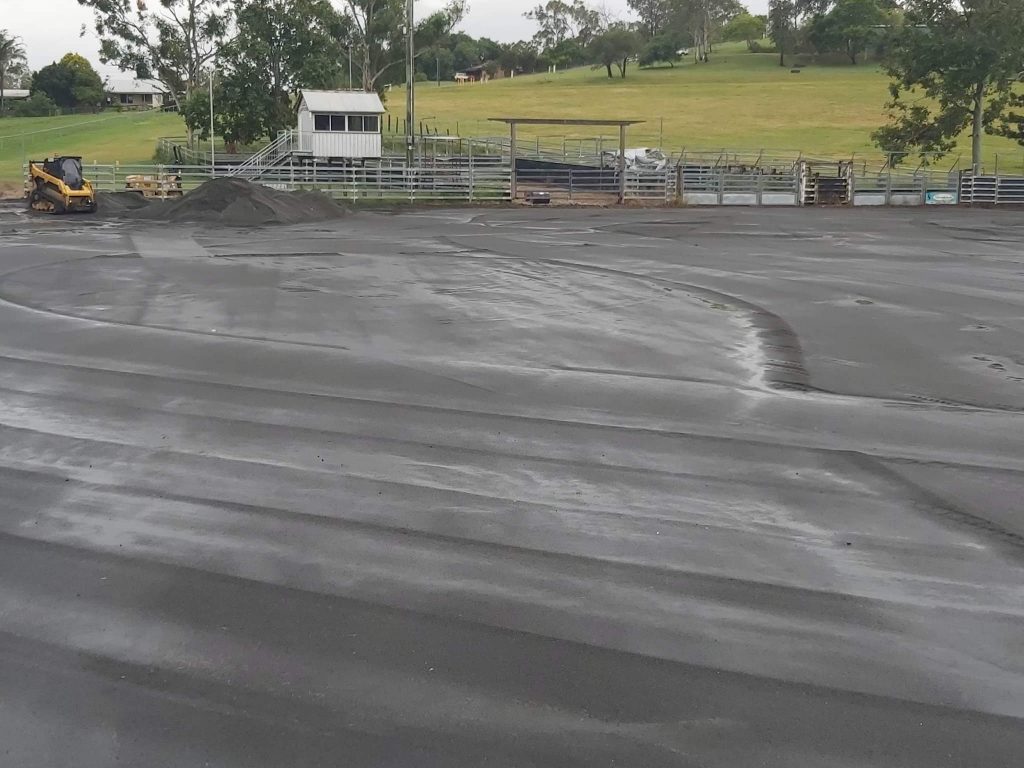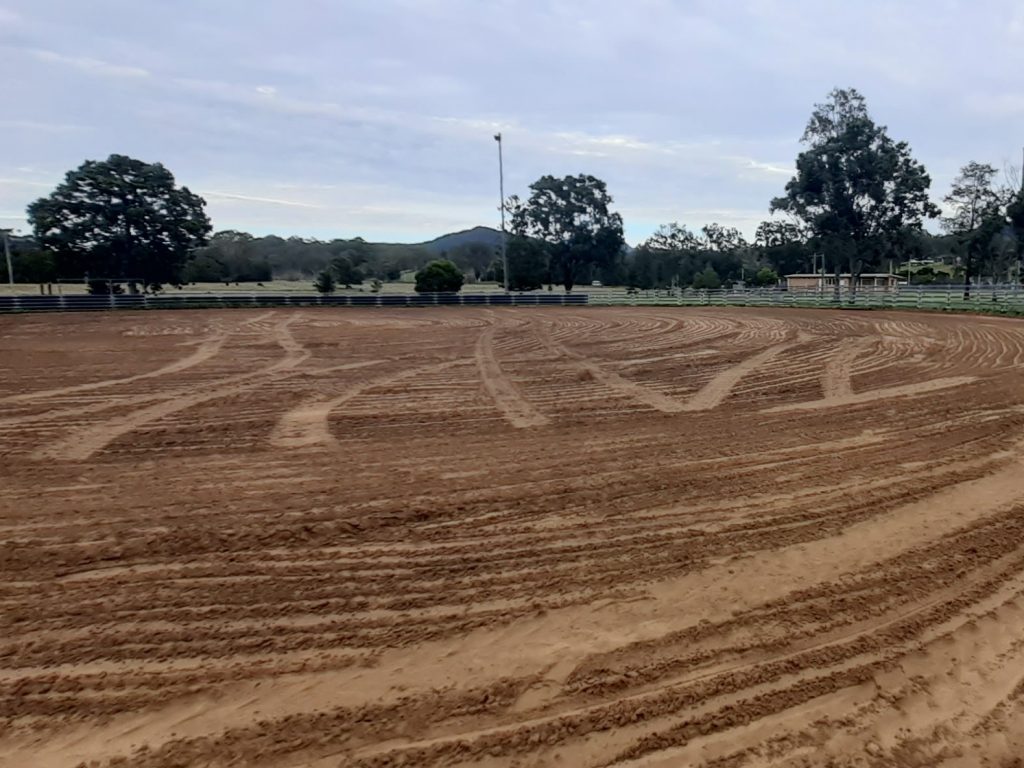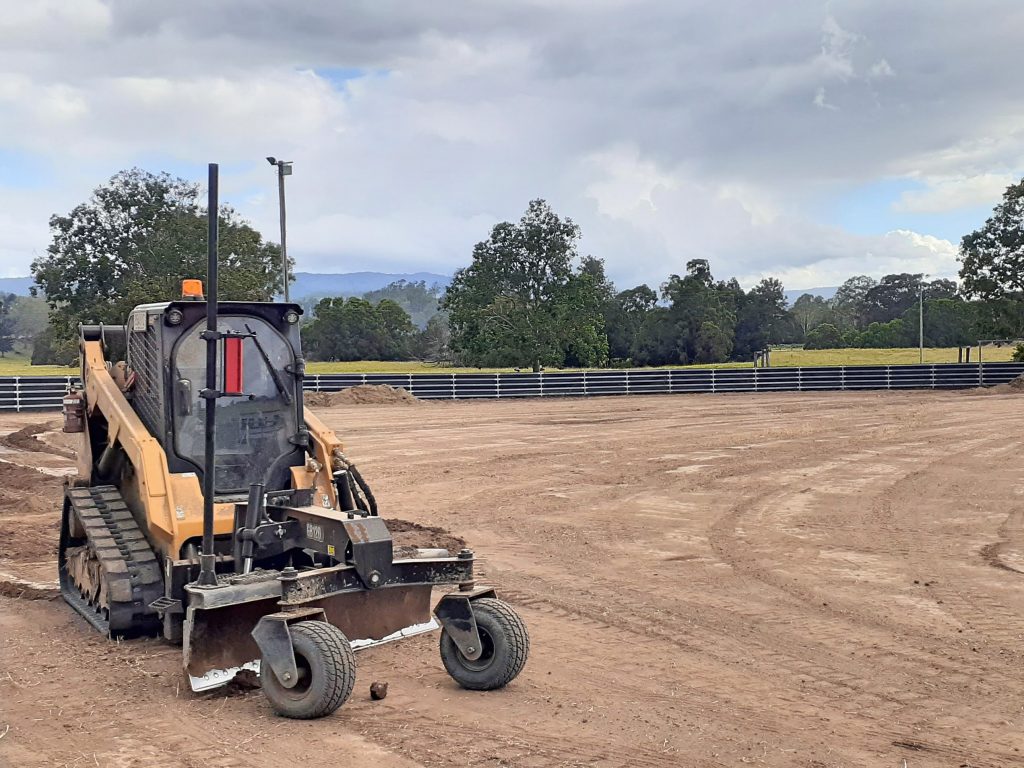Foundation for Rural & Regional Renewal (FRRR)
Funding for prevention, preparedness and recovery projects
FRRR and Suncorp Group are inviting local not-for-profit organisations (NFPs) in remote, rural and regional Queensland communities impacted by Cyclone Jasper and Kirrily to apply for a share of $300,000 in funding to support ongoing resilience building and recovery efforts.
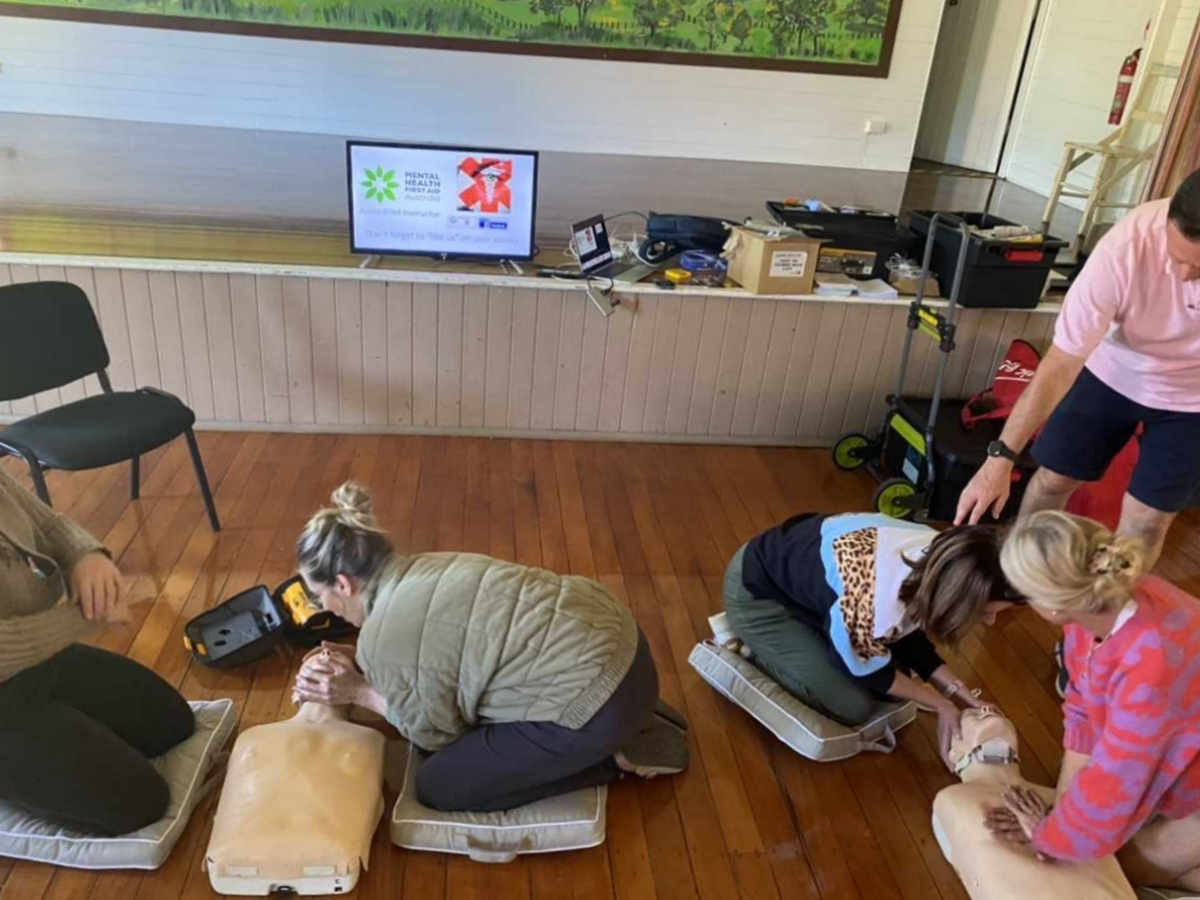
This week marks six months since Cyclone Jasper crossed the Far North coast (13 December 2023) causing widespread destruction and five months since Cyclone Kirrily crossed the North Queensland coast (25 January 2024) and became a state-wide disaster event, as the rain moved south and west (3 February 2024).
Local NFPs in the Far North and North Queensland, and other remote, rural and regional communities impacted by the cyclones, including McKinlay and Western Downs[1], can apply for grants up to $20,000 through the Rebuilding Futures program, for community-led activities that address local prevention, preparedness and recovery needs.
Nina O’Brien, FRRR’s Disaster Resilience & Recovery Lead, said that it is vital that disaster-impacted communities, are supported to proactively take action to prevent and prepare for, as well as respond to, the impacts of extreme weather events like Tropical Cyclones Jasper and Kirrily.
“The effects of an extreme weather event do not dissipate when the immediate danger is over. Recovery needs to evolve over the medium to long-term, as locals identify ways of building community resilience and reducing the impact of future disasters on community wellbeing and physical infrastructure.
“But for a community to build back better after a disaster, it’s critical that the needs of all groups in the regions, particularly members of the community with less access to resources, information and support, are considered and prioritised, both in recovery and in planning for potential future events.
“Ultimately, it is the people and processes that really make communities tick and make a difference in effective disaster recovery, prevention and preparedness.
“These grants are flexible and can support a wide range of projects, so we encourage groups to think laterally about what can assist their community,” Ms O’Brien said.
Funded by Suncorp Group, the Rebuilding Futures program has already distributed more than $1 million in recent years to 62 community groups across the country.
Steve Johnston, Suncorp Group CEO, said Suncorp was proud to support community-led recovery projects for regional Queensland communities impacted by severe weather events.
“Queensland is the most disaster-impacted state in the country and regional Queensland, particularly the Far North and North, has certainly borne the brunt of events like Cyclones Jasper and Kirrily,” Mr Johnston said.
“Suncorp is a proud Queensland-based company and will always be there to help our customers rebuild their lives following these devastating events, but we also understand how important it is to help community groups be prepared, build back better and assist that recovery in the medium and longer term.
“That’s why we partner with FRRR to distribute grants directly to community organisations because these groups have the local knowledge to know where funding is needed most.
“I want to encourage local organisations who may have been impacted by Cyclones Jasper and Kirrily to apply for funding for projects that will make their communities more resilient for the future,” Mr Johnston said.
A Grantseeker Workshop, including a Q&A on the Rebuilding Future’s grant program, will be held online on Tuesday 18th June 2024, from 12:30 – 1:30 pm AEST. Register for the Workshop at: https://events.humanitix.com/suncorp-rebuilding-futures-2024-grantseeker-workshop.
Grant applications close 5pm AEST, 11 July 2024.
For more information about which LGAs are eligible, the type of projects that can be funded and to register for the Grantseeker Workshop, visit www.frrr.org.au/Rebuilding-Futures.
[1] List of eligible LGAs – https://frrr.org.au/wp-content/uploads/R4-Eligible-LGAs.pdf
18 community groups to receive funding
In partnership with Suncorp and AAMI, FRRR has awarded $300,781 to 18 remote, rural and regional not-for-profits (NFPs) in Victorian communities impacted by the flooding events that took place between October 2022 and January 2023.
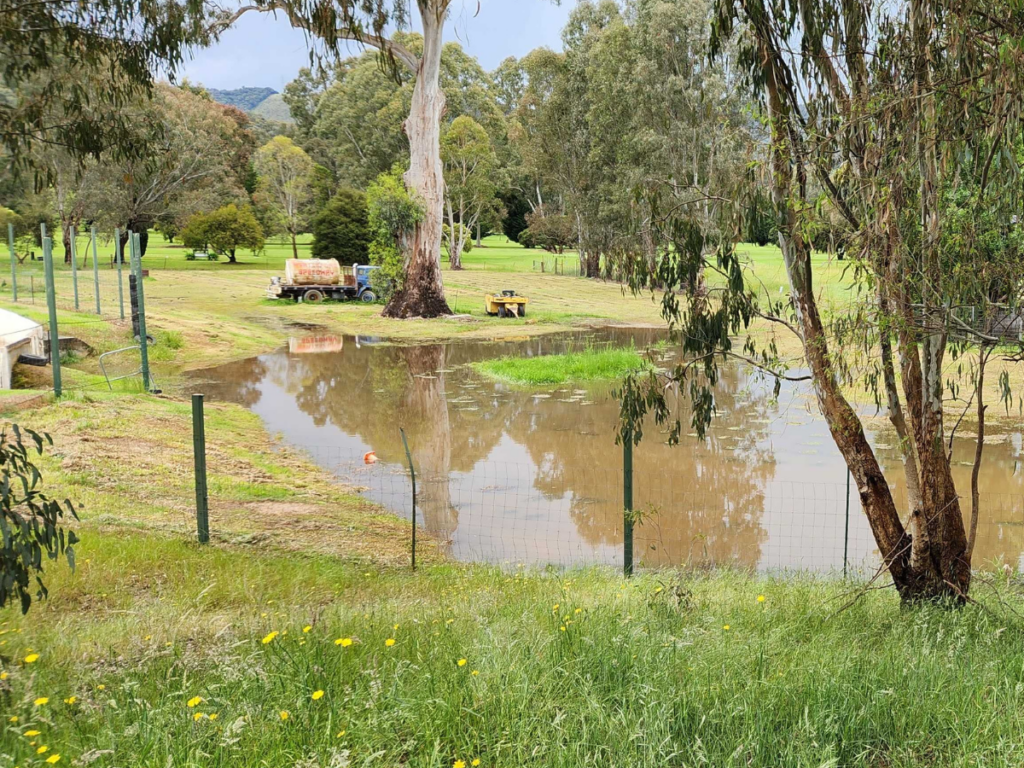
Suncorp Group pledged $1 million to FRRR in 2021 for a dedicated Rebuilding Futures program – to support Australian communities impacted by significant natural disasters.
This is the third round of the Program and with these grants will have distributed over $1 million.
The grants awarded range from $4,040 to $20,000 and will be used for a range of projects from building community infrastructure and improving emergency facilities, to youth activity programs and community workshops – all high-priority projects for their local community.
Suncorp Group CEO Steve Johnston said the grants would help support community-led recovery in the impacted areas.
“Australia is no stranger to natural disasters and unfortunately I’ve seen all too often the devastation and emotional toll they have on our communities,” Mr Johnston said.
“That’s why we are supporting affected Victorian communities through the Rebuilding Futures program – to not just build back but to build back better than before, making them even more resilient,” he said.
“These communities have been through a lot, and we know that recovery from severe weather events can sometimes take years. We also know that each community’s priorities during that recovery is different.
“We’re pleased to provide support to a range of different community groups and local not-for-profits that are run by people who know and understand what it is their community needs in order to rebuild.”
Nina O’Brien, Disaster Resilience and Recovery Lead at FRRR, said this round of grants is further confirmation of the long-term impacts of natural disasters.
“In this round of grants, we’re seeing projects that are about building community amenities and improving infrastructure but there’s also an emphasis on initiatives that are about building community resilience and promoting social wellbeing. It’s nearly a year since the floods first started and so this just goes to show that the impacts of floods are long-lasting and go far beyond the physical damage that’s caused.
“The floods have had a huge emotional toll on the people in these communities, yet they’re still determined to build back and become even more resilient than before, which really is inspiring to see. Thanks to the generous support of Suncorp and AAMI, we can help them to do just that,” said Ms O’Brien.
Among the 18 projects funded this round are:
- Alpine Multi Skill Group in Bright – Construction of a dedicated cabin workspace for volunteers, members, and the local community, which will support Alpine Multi Skill’s community development work and collaboration with the Men’s Shed – $19,750
- Echuca Moama Broadcast Service Inc in Echuca – Upskill the community radio volunteers, enhancing their ability to broadcast during and outside times of emergency disasters to support community safety and wellbeing – $4,040
- Kerang and District Community Centre Inc in Kerang – Build resilience in Kerang through an inclusive arts program aimed at connecting people through positive creative activities – $10,000
The full list of grant recipients and their projects is below.
| Organisation | Project | Location | Grant | |||
|---|---|---|---|---|---|---|
| VICTORIA | ||||||
| Alpine Multi Skill Group | Construction of a Dedicated Cabin Workspace for Volunteers, Members and the Local Community Expand the opportunities for community skills and preparedness activities through constructing a cabin to support Alpine Multi Skill's community development work collaborating with the Men's Shed. | Bright | $19,750 | |||
| Boys to the Bush Ltd | Boys to the Bush Building up Rochester Boys Support youth recovery and resilience through extra curricular programs developing life skills, experience of rural employment opportunities, community engagement and mentoring. | Rochester | $20,000 | |||
| Campaspe Park Raceway Committee of Management Incorporation | Disabled Access from Car Park to Clubhouse Improve access and community facility infrastructure with a concrete path from the carpark to clubhouse of the Campaspe Park and Raceway Recreation Reserve. | Echuca | $7,600 | |||
| East Loddon Food Share Program Incorporated | Relief Food and Fridge / Freezer Storage Build capacity of local food relief organisation with whitegoods, a generator and food supplies to support a 12 month program of food security. | Dingee | $15,699 | |||
| Echuca Moama Broadcast Service Inc | Upskill Broadcasting Team Build skills and capability for community radio volunteers to broadcast during and outside times of emergency disasters to support community safety and wellbeing. | Echuca | $4,040 | |||
| Eildon Events Inc | Construction of a Permanent Waterproof Cantilever Shade Structure Build capacity of the Eildon community with a cantilevered shade cover for a stage to increase usage and expand local activity. | Eildon | $20,000 | |||
| Greater Shepparton Foundation Limited | Giving Power Greater Shepparton Support community adaptation for long-term social and economic recovery through a collaborative scoping project to develop an accessible solar program for flood-impacted households in Greater Shepparton. | Shepparton | $20,000 | |||
| Kerang and District Community Centre Inc | Let's Connect via Art Build resilience in Kerang through an inclusive arts program aimed at connecting people in positive creative activities. | Kerang | $10,000 | |||
| Mount Alexander Shire Council | Creative Resilience Lab Build community resilience and preparedness through a future thinking workshop with a broad range of Mount Alexander community stakeholders. | Castlemaine | $20,000 | |||
| Myrtleford Recreation Reserve Committee of Management | Myrtleford Recreation Reserve Stormwater Management and Drainage Design Improve local recreation reserve through design of a stormwater management system to mitigate future flood risk, supporting community facility use for local events and organisations' activity. | Myrtleford | $20,000 | |||
| Navarre Public Hall | Revitalising the Navarre Public Hall Rebuild community infrastructure with contributions for rewiring and improved vent systems in the Navarre Hall restoration following significant flood disruption to the community. | Navarre | $20,000 | |||
| Open Door Neighbourhood House Inc | Connecting Community - Social Prescribing Build community resilience through implementing a 'social prescribing' program of connection for vulnerable members of the flood-impacted community of Wangaratta. | Wangaratta | $20,000 | |||
| Parklands Albury Wodonga Limited | Creating Nature Play Trails to Grow Resilience Build community resilience with enhanced community nature space and programs for intergenerational connection. | Wodonga | $20,000 | |||
| Pyramid Hill Neighbourhood House Inc | Communications Kit Build community resilience and capability through upgrading online and offline media communications to support the Pyramid Hill community during and outside of disasters. | Pyramid Hill | $13,900 | |||
| Rochester Community House Inc | Bringing the Roar to Rochy (Shire Hall) Upgrade community facilities with a new sound system at the Rochester Community Hall. | Rochester | $19,949 | |||
| Variety - The Children's Charity of Victoria | Replacement and Upgrade of Safe / Secure and Inclusive Play Environment for Echuca Twin Rivers Specialist School Upgrade the playground of the Echuca Specialist School to ensure a safe and flood proof surface for all abilities children from surrounding impacted flood communities. | Echuca | $18,668 | |||
| Yarrawonga Neighbourhood House Inc | YMCLC Community Connection and Resilience Program Boost community resilience with a Social Prescribing program for engaging and supporting vulnerable people in local activities and information to address mental and physical health issues. | Yarrawonga | $20,000 | |||
| Yea Community Service Group Inc | Hands on Skills for Community Build community resilience with a program of workshops teaching 'sufficiency' skills, including preserving foods, composting and dehydrating, with community connection a key outcome. | Yea | $11,175 | |||
Yarning and other culturally-informed models of health can support people in the community to explore factors that impinge on social-emotional wellbeing (SEWB) and co-create solutions for individual and family wellbeing, including young people.
(Murrup-Stewart et al, 2021)
The Northern River Community Healing Hub is a network of local Indigenous and non-Indigenous volunteers who practice a range of culturally informed trauma-integrated healing modalities including weaving circles, art therapy and bodywork (massage). The hub was established following the catastrophic 2022 flood event in the Northern Rivers.
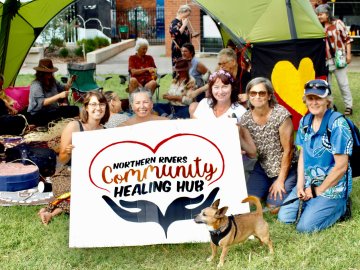
They received a grant for $24,570 through the Rebuilding Futures program, funded by the Suncorp Group to support the hub practitioners to grow and develop their work through increased service delivery moving from an entirely volunteer model to a hybrid paid / volunteer operation. NRCHH is available to all people, regardless of cultural background with a focus on their target population: Aboriginal and Torres Strait Islander people, children and young people, families, including older people. The project also included Mobile Hub operations to enable better access to the service within communities themselves – where they need them most, and in consultation with community.
The healing practice activity funded by the project has directly benefitted 639 people across the community at outreach to the pod villages of Coraki and Lismore, and tents at the Nimbin Aquarius Festival and Murwillumbah Kinship Festival, and workshops for a Queer Flood Recovery Event and an event for school children. In addition there have been weekly sessions at the Healing Hub including: 15 bodywork sessions per week free to the community; free flowing drop in weaving / yarning circle on Wednesdays; and clay art therapy once a week.
The NRCHH has evolved through the project. The paid / volunteer mixed model has been successful and they are now seeking input and collaboration that will deepen partnerships and relationships with the organisations that they currently work with to continue.
Project Manager Ruth Rosenhek said, “At the Healing Hub, we provide a de-clinicalised, informal soft-texture gentle space to support healing for our community that focuses on the whole person including a phenomenally successful bodywork program that runs alongside cultural activities such as weaving and yarning circles, creative arts and community connection. We have found that 18 months past the 2022 flood events, people continue to be managing high levels of stress and trauma. These cultural activities that involve sitting on country, slowing down the pace, connection and belonging are all powerful healing agents.”
By Nina O’Brien, Disaster Resilience and Recovery Lead
The call to action at this year’s Australian Disaster Resilience Conference is deeply apparent and has been reflected in most of the presentations, including my own – we must expand our understanding, balance investment, and elevate the voice of community, particularly First Nations people, to reduce the risks and impacts of a changing climate, and build collective resilience towards the increasing severity and frequency of disasters.
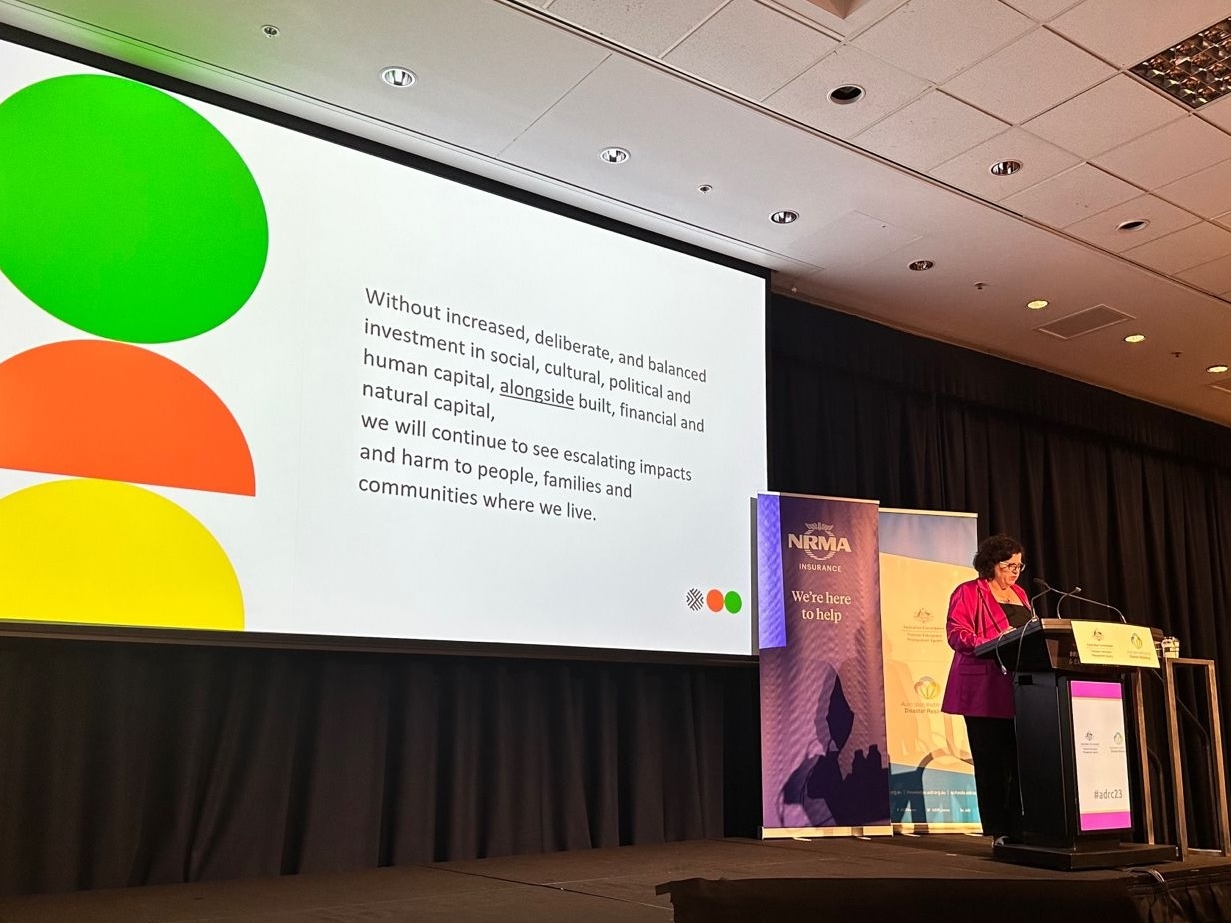
At FRRR, we are addressing this call to action by working deeply with local groups that are on the ground, working to enhance the preparedness and resilience of their remote, rural and regional communities. Programs like Disaster Resilient: Future Ready, as well as the thousands of grassroots, community-based projects we support through small grants like SRC Prepare and Recover , and others such as Rebuilding Futures, allow us to learn from local leaders about the needs and priorities of their communities, and how we can best support them to build local resilience and disaster recovery.
My presentation spoke of the importance of balanced investment in people and processes, not just products and ‘things’ across the entire disaster cycle, with a specific focus on preparedness. Social, cultural, political, and human capital are equally as vital as built, financial and natural capital in bolstering resilience. This approach takes a holistic view that acknowledges the interconnectedness of all these facets of community life.
This is why I advocate that we must shift our focus from (often) the disproportionate investing in products and things (hard infrastructure, as we often refer to it) to prioritising people and processes (or the soft infrastructure).
Ultimately, it is the people and processes that really make communities tick and make a difference in effective disaster response, recovery, and preparedness.
This is reinforced by the findings of ongoing research that FRRR has commissioned alongside our learning partner, University of Sydney.
“Working in a community led way to build local resilience means that local community members act as equal decision makers with a range of other stakeholders (local government, emergency services, service providers, business) to address issues which are priorities for that community. Rather than a top-down approach, where decisions are made outside a community or are made by government or other formal authorities, community led resilience building starts and continues with listening and collaborating on the priorities of community members. Genuine ownership by the local community requires their active involvement in all aspects of resilience building, not merely consultation.”
Howard, A., Rawsthorne, M. and Joseph, P. (2022) Critical Dimensions in Community Disaster Resilience [FactSheet], University of Sydney for the Foundation for Rural & Regional Renewal
The formal study has reinforced our anecdotal observations that when communities take the lead in driving resilience-building efforts, remarkable things happen. Whether tackling natural disasters like cyclones, bushfires, floods, or adapting to community shocks such as the loss of major services or industries, community-led initiatives tend to persist longer and have ongoing positive impacts. They foster local strengths that can adapt to a wide range of challenges over time.
This work provides an important formal evidence base for supporting grassroots not-for-profit organisations that are critical to nurturing the vitality of regional communities.
It also validates FRRR’s preferred approach of working alongside communities, mapping their assets and systems of interconnectivity, understanding their particular strengths and nuances, and viewing community life through resilience dimensions that help to identify and craft locally driven resilience initiatives.
Through diverse funding mechanisms that prioritise people and processes, we’ve seen tangible dividends in increased resilience. These include support for locally conceived projects and initiatives; building volunteer capacity and strengthening networks; resilience coaching, mentoring and support; strengthening internal organisational capacity; and fostering long-term project delivery capability through sustainable local partnerships.
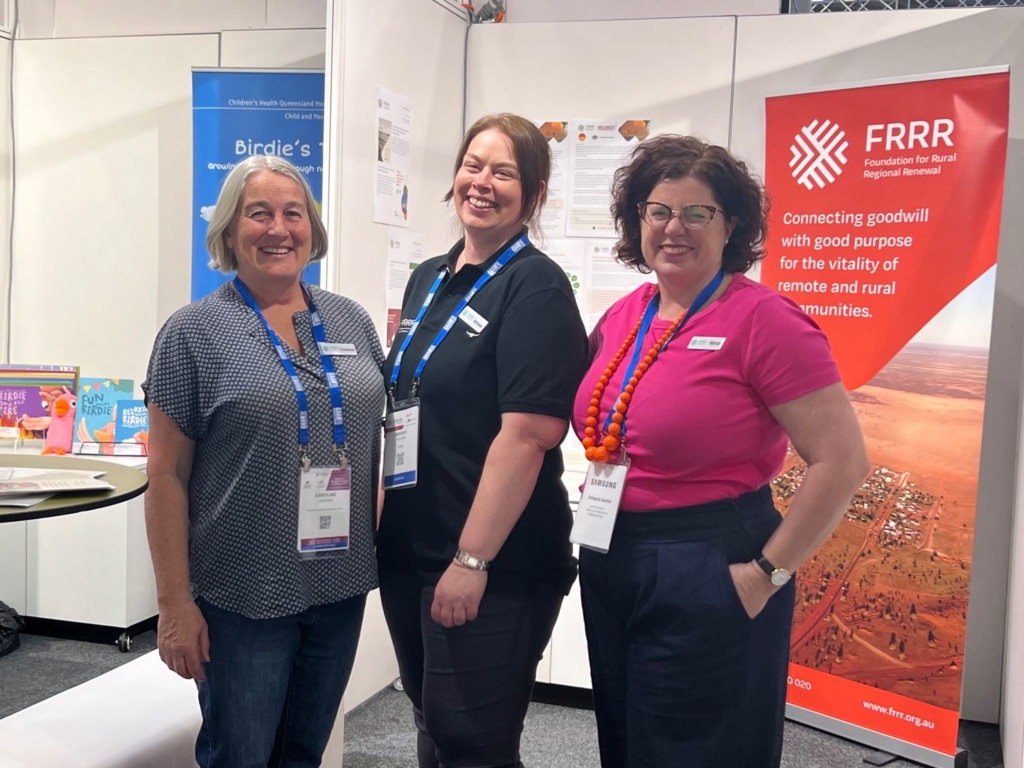
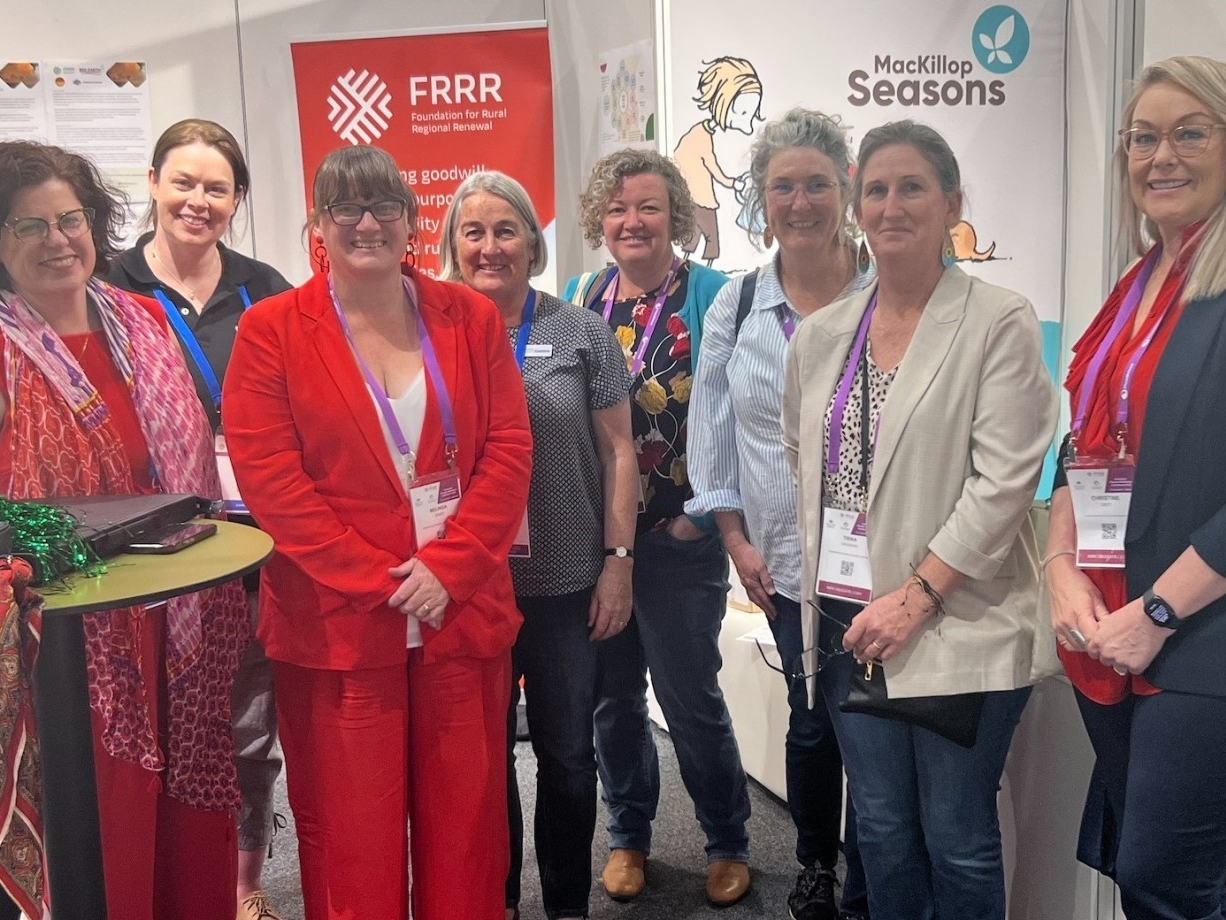
And as a side note from ADRC23; the feedback from communities is clear. They want flexible funding criteria, longer timelines, negotiated measures of success, simpler forms and reporting – and patience from funders. As a mechanism to deliver support to approximately 1000 small projects per year; with around half of those related to disaster impacts; FRRR is working hard to meet these requests with flexible guidelines, negotiated timelines where possible, agile timing, and a streamlined approach to applying and reporting.
Without deliberate, balanced investment in social, cultural, political and human capital, alongside traditional capital, the impacts and harm from disasters will continue to escalate in our communities. We need a systems-based lens that prioritises people and processes to meet future community needs and challenges effectively.
The long-term benefits of this shift are significant; capable local individuals, agile community-based networks, strong not-for-profit organisations and ultimately resilient remote, rural and regional communities become the norm. This paves the way for a future where communities can thrive, adapt and face the uncertainties of a changing climate, with resilience and hope.
Mission Australia has worked in partnership with Mid Coast 4 Kids to deliver ‘The Common Approach’ training to build capability for a whole of community response to child youth wellbeing in the Mid Coast region.
The Mid Coast was dramatically impacted by the South Eastern Australia floods in 2022. The townships of Taree, Wingham and Gloucester were inundated or compromised with flood waters and structural damage cutting communities off for long periods. There was flood damage to farm lands, residential housing areas and outlying communities. This disaster compounded significant stress that has been experienced in the communities for an extended period due to the impact of prolonged drought, COVID-19 and bushfires.
As a result, early childhood centres and schools reported increased anxiety and trauma-related behaviours in children and young people, and the service system was not coping, with allied health and other support services reporting wait times of more than 12 months.
‘The Common Approach’ has equipped a range of members of the Mid Coast community with the skills to have quality conversations and build resilience to respond to the wellbeing needs of children, young people and their families, now and into the future. In total, 228 people including community service, health and education professionals, community volunteers and parents were trained to have evidence based, holistic conversations with children and young people about all aspects of their wellbeing.
Participants report increased confidence in being able to support children and young people to identify strategies to improve individual wellbeing. “Through this intervention we have equipped our community to share responsibility for promoting and supporting the health and wellbeing of children and young people in our community, via evidence informed practice,” says Program Manager Bree Katsamangos.
“Additionally, practitioners will benefit from the opportunity to engage in a bi-monthly Community of Practice to support ongoing development and practice.”
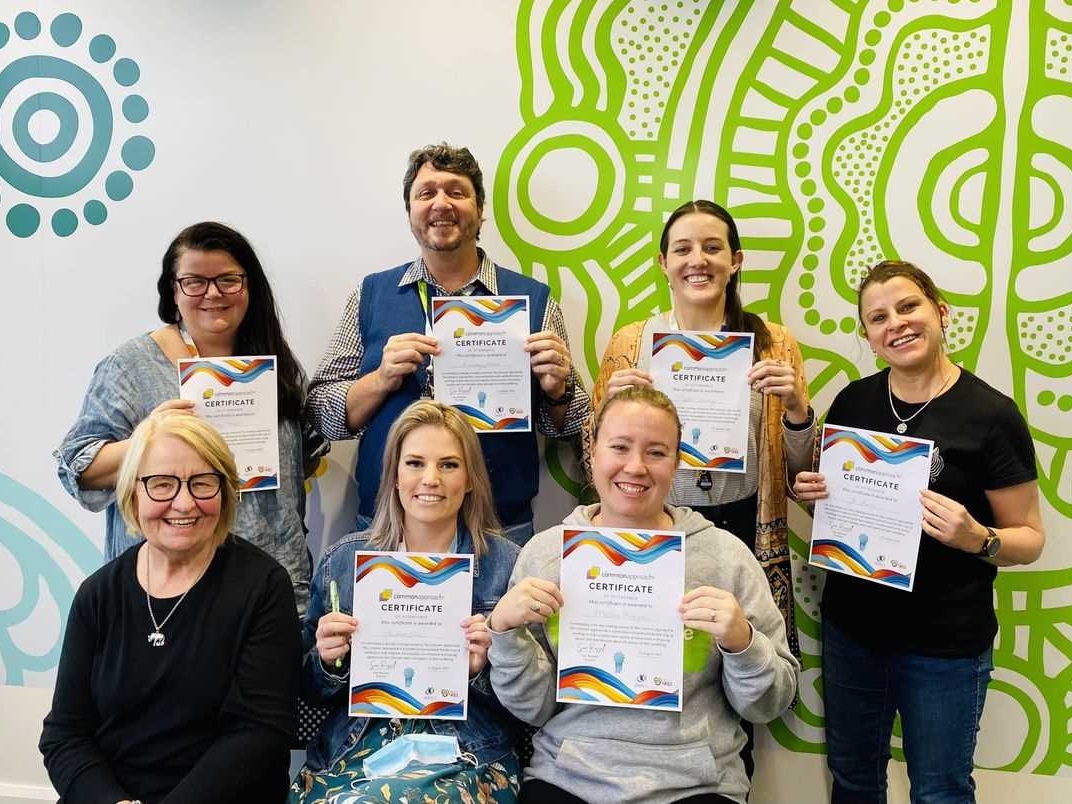
The Mooloolah Community Centre is the home and work hub of Mooloolah Valley Community Association Inc, located on the Sunshine Coast in Queensland. The Centre is run by a Management Committee of 10 volunteers from wide and varied backgrounds including finance, defence, nursing, social work, local government and administration, and there are a team of volunteers who support the Centre by doing tasks from garden maintenance to assisting in the Op Shop. Everyone at the Centre works for the benefit of the Mooloolah community, and the positive flow-on effects are felt throughout the Mooloolah Valley postcode area.
In February 2022, the flooding closed all roads into the town, cutting it off for four days and causing a loss of power across the area. The lack of a reliable power source during this disaster revealed critical vulnerabilities in the community for being able to charge phones and stay in touch with loved ones. Additionally there was no hot water and the Community Centre couldn’t open.
After receiving $25,000 in Round 2 of the Rebuilding Futures program, funded by the Suncorp Group, the Community Centre has now securely installed a solar battery pack ready for any future disasters or power outages. The installation of the solar batteries has completed a significant preparedness project by this group, who over the last year, have added emergency lighting, directional emergency lighting and evacuation alarms so the community can be prepared and therefore more resilient in times of extreme weather events.
The Community Centre says it is ready to support the needs of the community in times of distress, including having the Op Shop open to allow people to obtain emergency clothes if required, and enabling the Welfare Officer to operate and offer vouchers for food and fuel. The website has been updated with a new ‘Community Resilience Service’ that promotes an offering of a place of refuge during disaster, including the basics like a hot drink, charging phones, using the internet and much more.
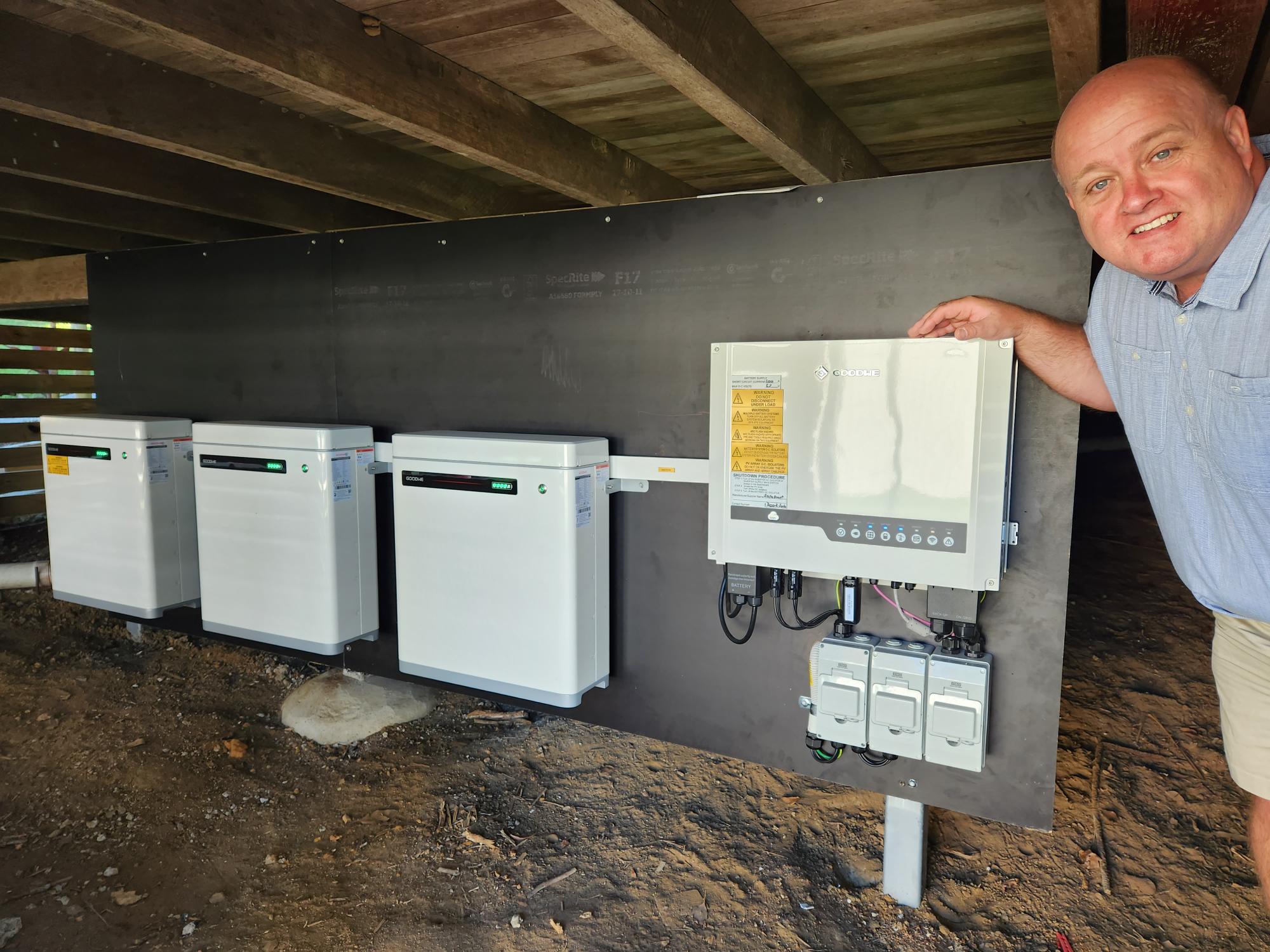
Mooloolah Valley Community Association Inc’s Events & Grants Officer, Jason Carroll
Grants up to $20,000 available for recovery projects
Local community groups and not-for-profits in rural Victorian communities impacted by 2022-23 floods are encouraged to apply for grants up to $20,000 for projects that will support their community’s recovery.
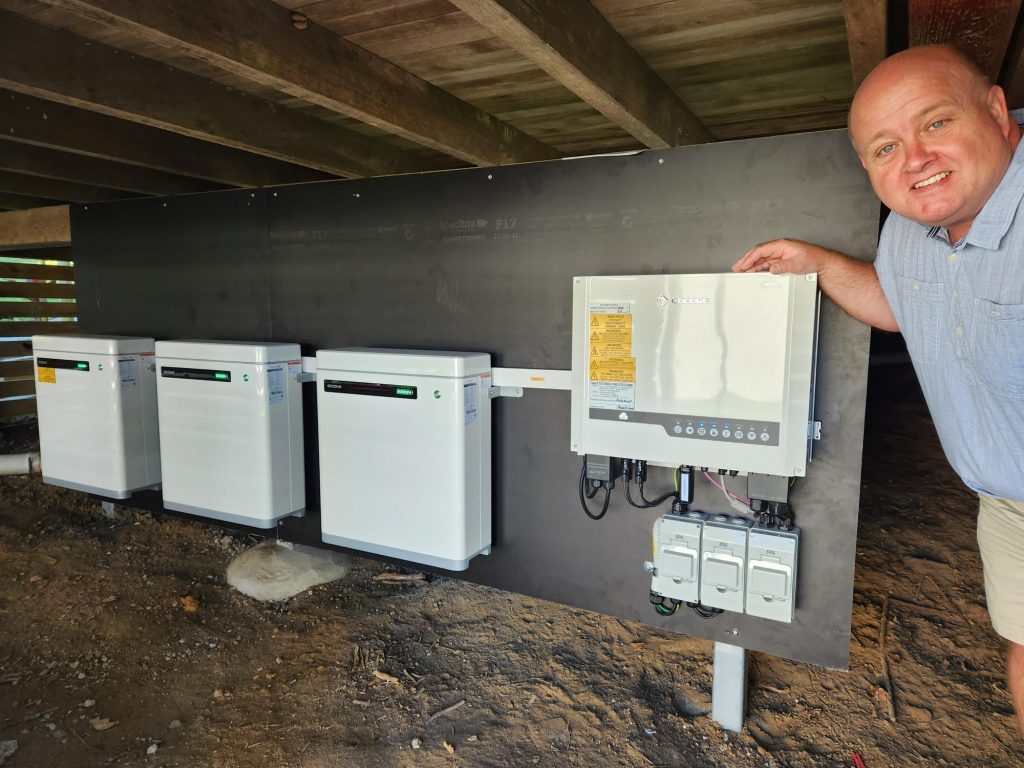
In partnership with Suncorp and AAMI, FRRR is offering $300,000 for initiatives that build resilience and support medium to long-term recovery of communities affected by the flooding and storms that occurred in specified LGA’s between 6 October 2022 and 13 January 2023.
Funded through the Rebuilding Futures program, these responsive grants are available for proactive initiatives that are community-led.
Nina O’Brien, FRRR’s Disaster Resilience & Recovery Lead, said that extreme weather events, like the flooding and storms experienced by rural Victorian regions late last year, affect every community member, especially those who are most vulnerable and rely on community organisations for support.
“Different groups within the community, such as those living with disability, homelessness or who speak English as a second language, will be impacted differently, and as such, will have their own needs in terms of building resilience and how they can prepare for future disaster events.
“We encourage community groups to be inclusive with their initiative ideas and consider how their project can support community members from all nationalities, socio-economic and cultural backgrounds.
“We also encourage community groups to think outside the box when it comes to infrastructure and equipment projects by considering resilient materials and harnessing clever use of design to decrease future impacts of natural disasters,” Ms O’Brien said.
Suncorp’s Group Executive People, Culture & Advocacy, Fiona Thompson, said that natural disasters, such as the Victorian floods, have devastating impacts that are complex, context-driven and long-lasting.
“This is the third disaster-affected region that we’ve supported through this program over the last couple of years, so we know the impacts in each place are different. One thing is always the same though; local people are best placed to know what the needs and priorities of their community, especially following a natural disaster event.
“Thanks to our partnership with FRRR, we’re pleased to be able to provide flexible funding that means communities can determine how best to address the medium to long-term recovery, resilience and preparedness needs and priorities for their region,” Ms Thompson said.
A Grantseeker Workshop, including a Q&A, on the Rebuilding Future’s grant program will be held online from 12 – 1pm AEST, Wednesday 7 June 2023. Register for the Grantseeker Workshop here.
Applications close 6 July 2023.
Previous projects funded through the Rebuilding Futures program include:
- During the floods in February 2022, Mooloolah Valley, QLD, experienced intermittent loss of power that impacted the community’s access to lighting, hot water and technology. To help the community prepare for future disaster events, the Mooloolah Valley Community Association Inc used a $25,000 grant to purchase and install three batteries that can be used to supply power to the region. The batteries are able to store energy from the Centre’s existing solar panels. The grant also funded fencing to ensure the new batteries are stored safely and securely. Thanks to the community’s resilience and preparedness, the batteries were able to keep the community’s power running during the two electricity outages that Mooloolah Valley has experienced since the batteries were installed.
- Following the NSW and QLD floods in 2021, Mission Australia and Mid Coast 4 Kids partnered to respond to child and youth wellbeing across the Mid Coast region. The partners used a $10,811 grant to deliver training to local community service, health and education professionals, volunteers and parents. Their aim was to ensure they were equipped with the skills to have quality conversations and build resilience to respond to the wellbeing needs of children, young people and their families.
For more information about which regions are eligible, the type of projects that can be funded, and to register for the Grantseeker Workshop, visit our Rebuilding Futures webpage.
27 community groups in disaster impacted areas of rural NSW and QLD to receive funding
FRRR, in partnership with Suncorp and GIO, has awarded $500,000 to 27 community groups and local not-for-profits (NFPs) to support recovery initiatives in rural communities impacted by the East Coast Australia floods in February and March 2022.
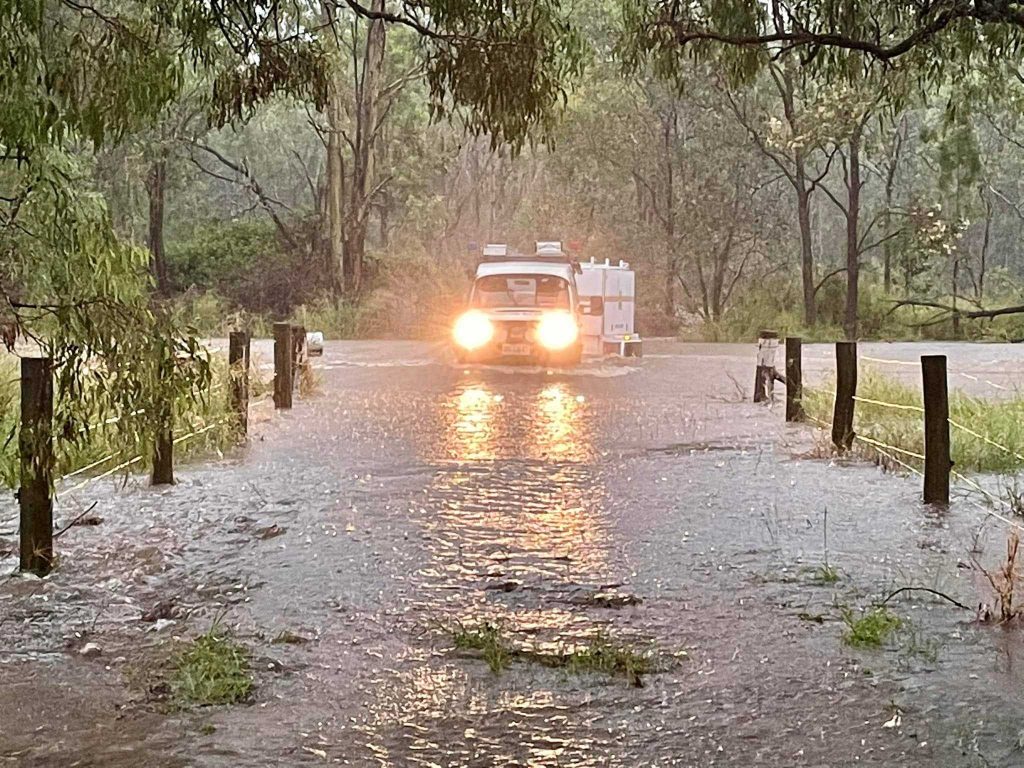
The grants, which are through the Rebuilding Futures program, range from $4,129 to $25,000.
They will be used to fund a range of projects, including equipping community facilities to be prepared for disasters, mental health training, community resilience and healing events, food security initiatives, environmental restoration, buying emergency equipment, restoring flood damaged infrastructure, developing preparedness plans and mentoring initiatives.
This is the second round of grants to come from the $1 million pledge the Suncorp Group made to FRRR to support recovery and preparedness activities in remote, rural and regional communities impacted by natural disasters.
Suncorp Group Head of Disaster Response & Customer Experience, Cath Stewart, said the diversity of applications shows the importance of responsive and flexible funding.
“The grant applications we received in this round are all the proof needed to reaffirm community leaders are best placed to understand exactly what the people in their areas need at this moment in time.
“These communities were all impacted by the same natural disaster, yet it’s very clear that they have diverse needs based on the point that they’re at on their road to recovery. We are pleased to be able to support a range of initiatives from building organisational capacity and giving locals the opportunity to develop their skills, to investing in life saving equipment and improving access to services,” said Ms Stewart.
Nina O’Brien, Disaster Resilience and Climate Solutions Lead at FRRR, said the grant recipients have shown commitment to the long-term recovery and resilience of their communities.
“People have had their lives turned upside down, yet they’re determined to work together to make sure their communities bounce back stronger than ever from the floods. Thanks to the generous support of GIO and Suncorp, we are able to offer the funding that will allow them to address their unique community recovery needs for rebuilding their future, and that’s exactly what each of the NFPs and community groups receiving funding are on a mission to do.
“Each of these initiatives, whether it be an upgrade to existing community facilities, the renewal of shared social spaces, improved community facilities, the purchase of emergency equipment or mental health support, is a practical response that will support long term recovery, which is exactly what is needed in the areas affected by floods and storms in early 2022.
“Recovery will take many years and every community has different needs and different capacity levels when it comes to tackling the recovery process. That’s why it’s so crucial that we provide these local groups with the support they need to build back better and design their own path to recovery, when they are ready,” said Ms O’Brien.
Among the 27 projects funded this round are:
- Surf Life Saving Far North Coast Branch Inc, Byron Bay, NSW – Mental Health Training and Support – $9,650 – Build community resilience through delivering a Mental Health Training and Support program to life savers, equipping them with skills to support themselves and their community.
- Resilient Lismore Incorporated, Lismore, NSW – Resilient Lismore – community recovery and connection events – $25,000 – Bolstering resilience to disaster by strengthening community connections and increasing mental health and wellbeing via a series of community events to be held around the anniversary of the February 2022 flood event in Lismore.
- Wilsons Creek Community Hall Inc, Wilsons Creek, NSW – Wilsons Creek Community Hall Solar Storage Battery – $12,240 – Build capacity of Wilsons Creek Community Hall to stay in contact by purchasing a solar battery to ensure power supply during extreme weather events.
- The Trustee for Top Blokes Foundation, Beaudesert, QLD – Building the resilience of vulnerable young men in the Scenic Rim – $25,000 – Improve the mental health and community engagement skills of at risk and disadvantaged young boys to bolster recovery in flood impacted communities.
- Glastonbury Hall & Recreation Association Inc, Glastonbury, QLD – Rebuilding for the Future – Glastonbury Disaster Centre Hub – $25,000 – Build capacity at Glastonbury Hall to support community with adequate kitchen facilities during refuge from disasters and to support community connection activities.
- Tansey Show Society Incorporated, Tansey, QLD – Upgrade facilities at Tansey Showgrounds – $15,000 – Boost organisational resilience and community wellbeing by repairing the flood damaged shower blocks at Tansey Showgrounds.
The full list of grant recipients and their projects is below.
More information on the Rebuilding Futures grant program is available on FRRR’s website.
| Organisation | Project | Location | Grant | |||
|---|---|---|---|---|---|---|
| NEW SOUTH WALES | ||||||
| Agape Outreach Inc | After the Floods - Food Insecurity & Poverty Support - Caring for the Community Support community members impacted by floods to access food relief in an environment of insecurity and homelessness risk. | Tweed | $15,000 | |||
| Byron Region Community College | Demonstration Garden for Sustainability and Resilience Strengthen the social fabric of Byron with a sustainable and resilient garden at the adult learning centre designed to inspire and educate community with an interactive space also supporting mental health and wellbeing. | Mullumbimby | $24,630 | |||
| Casino Indoor Stadium Association Inc | Blue Light Nights Build community capacity of children and young people in Casino with equipment for Blue Light Night events such as discos that will develop relationships with local police and support learning event management skills. | Casino | $10,572 | |||
| Friends Lismore Regional Gallery Inc | Beyond Bricks and Mortar: The Art of Renewal in Lismore Renew and activate the arts community in Lismore through tours of neighboring galleries, open art studios and panels to bolster regeneration of artist practice and broad community engagement. | Lismore | $12,295 | |||
| Human Nature Adventure Therapy Ltd | Thrive Outside: A Recovery and Resilience Project Support young people who experienced trauma through the flood events to build resilience through therapeutic outdoor group activities. | Ballina | $19,920 | |||
| Holding Hands Undergound | The Grief and Gratitude Project: A Process for Collective Care and Connection in a Time of Major Crisis Supporting community connection with an arts based event to enable collective recovery activity with themes of grief and gratitude. | Mullumbimby | $25,000 | |||
| Hunter Prelude Limited | Hunter Prelude Supported Playgroups Increase support to playgroups with additional allied health or teaching staff that enhance the engagement of parents and address issues of isolation and trauma within the families. | Kurri/Cessnock | $19,400 | |||
| Nambucca Valley Phoenix Limited | Roof Replacement Ceramics Yurt & Kitchen Replace damaged roofing at the ceramics yurt and kitchen annex to increase resilience of the facility's infrastructure to weather and support ongoing community activities. | Bowraville | $25,000 | |||
| Northern Rivers Community Healing Hub - Rekindling the Spirit Limited | Northern Rivers Community Healing Hub in Action Build capacity for piloting a transition to paid / volunteer model of community healing practices that will support holistic recovery now and ongoing with strong health partnerships. | Lismore | $24,750 | |||
| Resilient Lismore Incorporated | Resilient Lismore - Community Recovery and Connection Event Bolstering resilience to disaster by strengthening community connections and increasing mental health and wellbeing via a series of community events to be held around the anniversary of the February 2022 flood event in Lismore. | Lismore | $25,000 | |||
| Surf Life Saving Far North Coast Branch Inc | Mental Health Training and Support Build community resilience through delivering a Mental Health Training and Support program to life savers equipping them with skills to support themselves and their community. | Byron Bay | $9,650 | |||
| The Big Scrub Orchestra | Modern Band Healing Through Songwriting and Music to Improve Resilience and Wellbeing for Young People Impacted by Floods Build the resilience of school children impacted and displaced by flooding in Grafton, Lismore and Casino through musical workshops that will culminate in a performance at the local Jacaranda Festival. | Grafton | $25,000 | |||
| The Colony Bees Association Inc | Pollinate Country Rebuilding pollinator health and habitat in the Northern Rivers, by establishing new beehives, pollinator sanctuaries and native habitats. | Ballina | $18,202 | |||
| Volunteer Marine Rescue NSW | Capacity Building for the Improved Response to Emergencies with Our Region Build capacity of Volunteer Marine Rescue to support flood impacted communities in the future and enhance their everyday emergency operations with a trailer to transport a rescue boat. | Brunswick Heads | $15,000 | |||
| Wesley Community Services Limited, trading as Wesley Mission | Wesley LifeForce Suicide Prevention and Mental Health Resilience Project Support mental health and reduce stigma associated with suicide through training to develop skills and understanding in the Coffs Harbour community. | Coffs Harbour | $22,000 | |||
| Wilsons Creek Community Hall Inc | Wilsons Creek Community Hall Solar Storage Battery Build capacity of Wilsons Creek Community Hall to stay in contact by purchasing a solar battery to ensure power supply during extreme weather events. | Wilsons Creek | $12,240 | |||
| QUEENSLAND | ||||||
| Glastonbury Hall & Recreation Association Inc | Rebuilding for the Future - Glastonbury Disaster Centre Hub Build capacity at Glastonbury Hall to support community with adequate kitchen facilities during refuge from disasters and to support community connection activities. | Glastonbury | $25,000 | |||
| Highfields Pioneer Village Museum and Park Inc | Ramp It Up Repair pathways and ramps impacted by flood waters to provide access for disabled and elderly visitors. | Highfields | $4,129 | |||
| Kerry Memorial Hall | Kerry Valley: Diversity, Resilience & Strength (DRS) Upgrade historical community facilities with infrastructure materials and equipment to enable compliance for evacuation centre and to strengthen community wellbeing. | Kerry | $7,293 | |||
| Kin Kin Community Group Inc | Volunteer and Emergency Response Community Hub Build capacity through setting up local facility to support community during disasters. | Kin Kin & Como | $25,000 | |||
| Lowood Group State Emergency Service Financial Support Unit Inc | Lowood Emergency Back Up Generator Build the capacity of Lowood SES through the purchase of a generator to ensure shed operations during power outages to support crew and community needs. | Lowood | $23,485 | |||
| Mooloolah Valley Community Association Inc | Emergency Power for the Community Centre Build the organisational capacity of the Mooloolah Valley Community Centre with the purchase of a solar battery for power supply in extreme weather events. | Mooloolah Valley | $25,000 | |||
| Rathdowney and District Memorial Grounds Association Incorporated | Caravan Park Hot Water & Dryer Build community resilience and organisational capacity with the purchase of a washing machine and clothes dryer to support tenants, visitors, and the community at the volunteer run caravan park in Rathdowney. | Rathdowney | $7,784 | |||
| Tansey Show Society Incorporated | Upgrade Facilities at Tansey Showgrounds Boost organisational resilience and community wellbeing by repairing the flood damaged shower blocks at Tansey Showgrounds. | Tansey | $15,000 | |||
| The Trustee for Raise Foundation | Raise Mentor Program - Pittsworth State High School Build resilience in young people affected by floods with supported mentoring at Pittsworth State High School. | Pittsworth | $25,000 | |||
| The Trustee for Top Blokes Foundation | Building the Resilience of Vulnerable Young Men in the Scenic Rim Improve the mental health and community engagement skills of at risk and disadvantaged young boys to bolster recovery in flood impacted communities. | Beaudesert | $25,000 | |||
| Toowoomba Hospital Foundation | Saving and Preserving the Darling Downs Health Museum Weather Affected Collection and Displays Support restoration and disaster preparedness planning to save the flood impacted collection of Toowoomba Hospital Health Museum and train volunteers to respond effectively in future emergency situations. | Toowoomba | $16,560 | |||
Grant funding is now available to support communities in remote, rural and regional Queensland and New South Wales who have been impacted by this year’s flooding events.
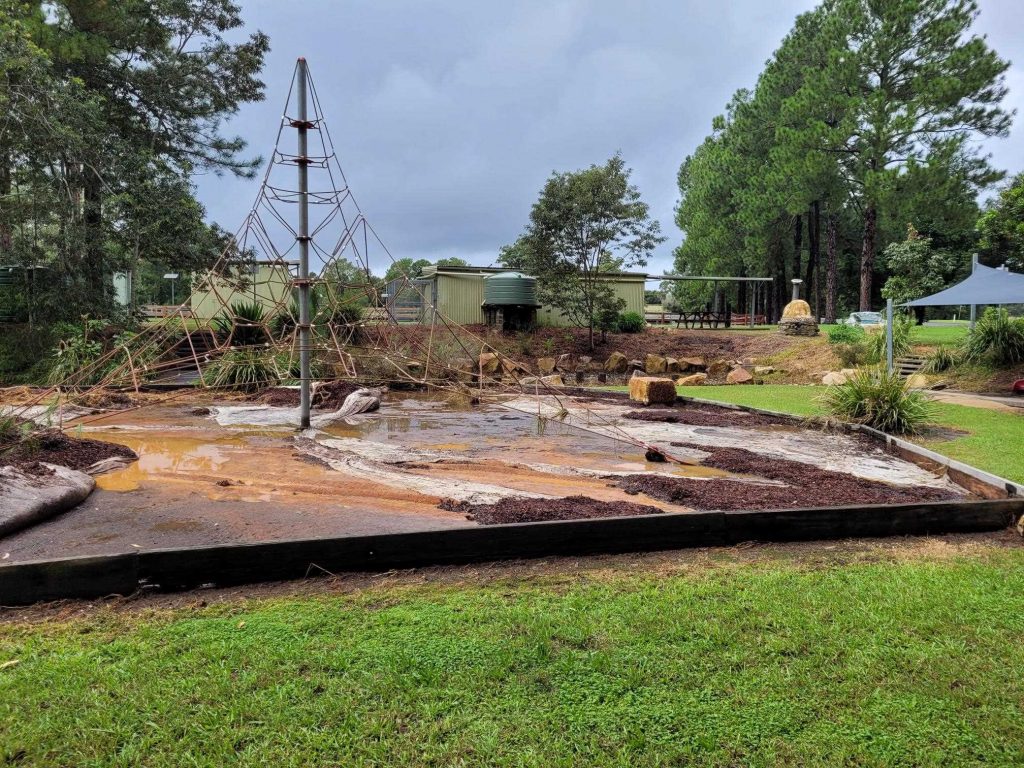
Suncorp and GIO have partnered with the Foundation for Rural & Regional Renewal (FRRR), through the Rebuilding Futures program, to offer $500,000 in grants of up to $25,000 to help not-for-profit groups and local community organisations to rebuild and recover from this year’s flood events.
Suncorp’s Head of Flood Response and Recovery, Cath Stewart, said that this funding recognises that while the initial clean up may have concluded, many community groups still have a lot of work to do to support their community’s ongoing recovery.
“The floods were devastating and, sadly, some places were affected more than once. On top of weather events and the impacts of COVID, not to mention the increased costs of living that are putting pressure on local businesses and community members, many groups are finding it really hard to access resources they need to support their community.
“These grants, which can be used to support locally-identified recovery and rebuilding priorities, will hopefully relieve some of those pressures and allow the communities to start moving forward,” said Ms Stewart.
FRRR CEO, Natalie Egleton, said that Suncorp and GIO’s support means that there is flexible funding available to help communities rebuild and be better prepared for future disaster events.
“We know that local community leaders are the ones who are best placed to know what their community needs. That’s why we made sure these grants can fund a wide range of activities, events, initiatives and small-scale infrastructure or equipment projects. The aim is to ensure that the community can build resilience by improving facilities for mitigation and preparedness and creating opportunities to reconnect, share experiences or support overall wellbeing and improved mental health, in whatever way makes most sense to that community.
“We look forward to engaging with these groups and are hoping that for some the grant opportunity can be a catalyst for projects that reduce the impact of future disasters on community wellbeing and physical infrastructure,” Ms Egleton explained.
For more information about who is eligible and what can be funded, visit www.frrr.org.au/Rebuilding-Futures.
A Grant Seeking Workshop including a Q&A on the Rebuilding Future’s grant program will be held online from 1 – 2pm AEST Tuesday 23 August 2022.
Applications close 28 September 2022.
The Rathdowney Memorial Grounds Association (RMGA) was established in 1947 to manage the Rathdowney Memorial Grounds and to organise an annual campdraft in honour of the young men in the district who lost their lives during the war.
Today, the Memorial Grounds and Caravan Park are managed by a small committee of local people, and the venue is used for a range of sport and community activities, including soccer, pony clubs, campdrafting, markets and camping. It also serves as a central place to coordinate the community response to natural disasters and emergencies, and was used by residents displaced in the 2019 Black Summer bushfires.
The annual campdraft is popular with locals and visitors alike, and central to the town’s identity and prosperity. It attracts around 1,000 visitors who come for the weekend and spend at the grounds and at local shops, making a vital contribution to the local economy. In 2020, the campdraft was cancelled due to COVID and the whole community suffered financially and socially.
The open-air equestrian arena at the Rathdowney Memorial Grounds was inundated by heavy rain in March 2021 and the arena surface was so badly damaged that the annual campdraft had to be postponed. Plans to refurbish the sand in the arena were delayed because the flood-damaged surface needed to be re-levelled, compacted and protected with crusher dust before new sand was added.
RMGA received a $15,000 Rebuilding Futures grant funded by Suncorp Group that allowed them to repair the equestrian arena, and to mitigate the impacts of future flood events on the Rathdowney Memorial Grounds.
President of RMGA Andrew Buchanan said that during the project delivery phase, the region continued to experience unprecedented rain, which held up the work. However this actually proved to be invaluable because the work that was being done was tested and could be improved straightaway.
“The arena is now safe to use regardless of the weather (exceptional circumstances not included), which allows the community to be able to plan and feel sure that our events will be able to go on regardless. The entire community is so grateful to be able to utilise the arena. This has had a huge impact towards the connectedness within our area.”

